
TUM ASIA VIRTUAL WORKSHOP 2023:
VERTICAL TAKE-OFF AND LANDING (VTOL) – DESIGN CHALLENGES FOR FLYING IN AN URBAN ENVIRONMENT
5 CLASSES | 5 AEROSPACE ENGINEERING TOPICS
5, 11, 12, 19, 25 APRIL 2023 | TUESDAYS & WEDNESDAYS

TUM ASIA VIRTUAL WORKSHOP 2023:
VERTICAL TAKE-OFF AND LANDING (VTOL) – DESIGN CHALLENGES FOR FLYING IN AN URBAN ENVIRONMENT
5 CLASSES | 5 AEROSPACE ENGINEERING TOPICS
5, 11, 12, 19, 25 APRIL 2023 | TUESDAYS & WEDNESDAYS
Experience an exhilarating learning adventure on Aerospace Engineering delivered exclusively by eminent Professors from the Technical University of Munich (TUM), Madras Institute of Technology (MIT) Anna University and Indian Institute of Technology (IIT), Madras, on various topics on Aerospace Engineering. The virtual workshop is complimentary and carefully designed to allow students to learn from different Professors coming from various parts of the world, and develop an appreciation for Aerospace Engineering.
*The workshop is complimentary. To register for the virtual workshop, please fill in your particulars in the form below and submit a motivation letter on your interest in Aerospace Engineering and how this workshop could potentially benefit your studies or career in Aerospace Engineering. An e-certificate will be issued upon completion of the workshop. Please note: Attendance of the workshop will be confirmed if 75% of the lecture series have been completed.
KEY TOPICS
Dates
5, 11-12, 19, 25 April 2023
(Tuesdays and Wednesdays)
Platform of Aerospace Engineering Workshop
Zoom Cloud Meeting (Zoom link will be sent to you 1 week before the event)
Eligibility Criteria
All undergraduate (Bachelor’s) students are welcome to apply for the Aerospace Engineering Workshop by submitting a Motivation Letter.
All classes will be conducted in English. Participants should ensure that they are proficient in English (reading and writing) at the university level.
Participation Fees
complimentary
| PROF. DR.-ING. FLORIAN HOLZAPFEL
Professor
Technical University of Munich
|
 |
Dynamic Challenges of Electric Vertical Take-Off and Landing
In spite of the current health crisis, aerospace research and development have currently embarked on a thrilling journey.
Step changes in many technologies like electric propulsion, power electronics and energy storage just, miniaturised high performance sensors, rigged computing resources with unprecedented computational power for safety-critical real time computations and finally tremendous advances in modeling, simulation and system analysis enable what many call the “Third Revolution of Aerospace”.
Delivery drones, urban air mobility – utilising the sky above us in a sustainable and automated manner for the good of all has just come in our reach.
But to make this happen, serious hurdles need to be overcome and challenges need to be met. Over the first century of aviation almost all aircraft looked alike – fuselage, wing, empennage, engines. Now a wealth of new configurations enter the stage. What are their dynamic challenges? What are their potentials and shortcomings? Where is the limit?
| PROF. DR.-ING MANFRED HAJEK
|
 |
Flying Electric in the Urban Environment – When Will It Happen?
With several hundreds of Electric Vertical Take-Off and Landing (eVTOL) projects worldwide, start-up companies and big players in the aviation industry are trying to make a revolution happen. They all share the same dream that in only a few years from now, using an air taxi shall be as expected and easy as a ride with Uber®. But other than the car, the eVTOL will not get stuck in a traffic jam, it will fly on a direct line towards your destination – with zero emission, and it will cost marginally more than a cab.
If we want to find out when all this will be a reality, we need to have a closer look at the biggest challenges lying ahead:
– Will all necessary technologies for this scenario be available and mature on time?
– Will eVTOL traffic over densely populated urban areas be safe enough?
– Can I land anywhere in a city – or will there be regulations and constraints?
– How affordable will air taxi flights be?
The essence of this talk will be: It requires engineers to find answers to these questions! Even though financial, commercial, or legal aspects might be at the centre of public discussions, it requires engineering solutions as an essential basis first. Engineers will have to provide new technologies for performance and efficiency and the safety or commercial viability of future UAM.
| PROF. DR. SOPHIE F. ARMANINI
|
 |
Prof. Armanini’s research interests include flight dynamics, system identification and control, especially for unconventional and unmanned aircraft – with the goal of enabling higher efficiency and sustainability, improved performance and novel applications. A major focus of her has been on bio-inspired flight. Her current research will additionally extend to apply her background in unconventional aircraft mechanics to investigate more sustainable flight solutions, including electric and hybrid aircraft.
| PROF. (DR.) NANDAN K. SINHA
|
 |
Aircraft Autonomy: Current Status and Challenges (Part 1)
Several inadvertent flight conditions such as loss-of-control and conflict scenario demand aircraft to initiate maneuvers that are often difficult for human pilots to execute. For other numerous tasks for unmanned vehicles, it is desired to develop control and guidance algorithms to facilitate in-built autonomy. More often, knowledge of external known or developing unknown conditions drive development of guidance algorithms for autonomy. For atmospheric aerodynamic vehicle configurations with actuator position and rate limits the guidance algorithms need to be often tested and verified separately. Thereby, development of integrated guidance and control algorithms that work on apriori knowledge of global dynamics and safe flight envelope of vehicle is crucial. The talk will focus on development of a generic integrated control and guidance platform utilizing fully nonlinear six-degree-of-freedom model of aircraft for executing maneuvers to achieve intended tasks within safe flight envelope.
| ASST. PROF. (DR.) DEVAPRAKASH MUNIRAJ
|
 |
Aircraft Autonomy: Current Status and Challenges (Part 2)
Unmanned aircraft systems (UAS) are becoming ubiquitous and are increasingly deployed in diverse applications ranging from package delivery, disaster relief, and law enforcement, to name a few. These applications require the UAS to operate in dynamically changing uncertain environments and share the airspace with other aircraft. Many UAS are deployed in safety-critical applications, where collateral damage due to incorrect operation or purposeful attacks by malicious agents might lead to human casualties. It is therefore extremely critical to ensure the safe integration of UAS into the civilian airspace. In that regard, this talk focuses on extending the capabilities of existing tools or developing novel approaches to answer the following questions. Is the UAS doing what it is supposed to do? Does the UAS guarantee robust performance despite significant disturbances in the form of steady wind, turbulence, and sensor noise? Can the UAS maintain safe operation in the presence of intentional attacks from adversarial agents? The talk provides an overview on how ideas from robust control theory, compositional verification, and security-aware design could be used to answer the aforementioned questions.
| PROF. (DR.) K.M. PARAMMASIVAM
|
 |
Electric Propulsion Systems
The science of electric propulsion encompasses a wide variety of strategies to achieve thrust and they can be broadly classified as electrothermal, electrostatic and electromagnetic systems.
The present lecture introduces the concept of electric propulsion and its broad classification. The basic operating principle of such systems are described successively in the lecture followed by ample examples, including various space missions that employ such systems. The next part of the lecture focuses on making a comparison between electric propulsion systems and conventional chemical propulsion systems in terms of various performances and operating parameters. The evolution of electric propulsion systems and the challenges associated with each propulsion system are discussed in detail which will help in charting out the trends in present and future space transportation missions including deep space missions. The physics and working of resistojets, arc jets, ion and hall thrusters, pulsed plasma thrusters (PPT) and Magneto plasma dynamic thrusters (MPD) are discussed along with calculations of performance parameters. The final part of lecture lists out unique opportunities in electric propulsion systems research in the present global scenario.
| DATE / TIME | PROGRAMME | |
| 5 April 2023, Wednesday
7pm – 9pm (SGT) 1pm-3pm (CET) 4.30pm – 6.30pm (IST)
|
Aircraft Autonomy: Current Status and Challenges
Speakers: Prof. (Dr.) Nandan K. Sinha, IIT Madras |
|
| 11 April 2023, Tuesday
7pm – 9pm (SGT) 1pm-3pm (CET) 4.30pm – 6.30pm (IST) |
Flying Electric in the Urban Environment: When Will It Happen?
Speaker: Prof. Dr.-Ing. Manfred Hajek, TUM |
|
| 12 April 2023, Wednesday
7pm – 9pm (SGT) 1pm-3pm (CET) 4.30pm – 6.30pm (IST)
|
Electric Propulsion Systems
Speaker: Prof. (Dr.) Parammasivam, MIT Anna University |
|
| 19 April 2023, Wednesday
7pm – 9pm (SGT) 1pm-3pm (CET) 4.30pm – 6.30pm (IST)
|
Dynamic Challenges of eVTOL Aircraft
Speaker: Prof. Dr.-Ing. Florian Holzapfel, TUM |
|
| 25 April 2023, Tuesday
7pm – 9pm (SGT) 1pm-3pm (CET) 4.30pm – 6.30pm (IST)
|
Topic: TBA
Speaker: Prof. Dr. Sophie F. Armanini, TUM |
|
